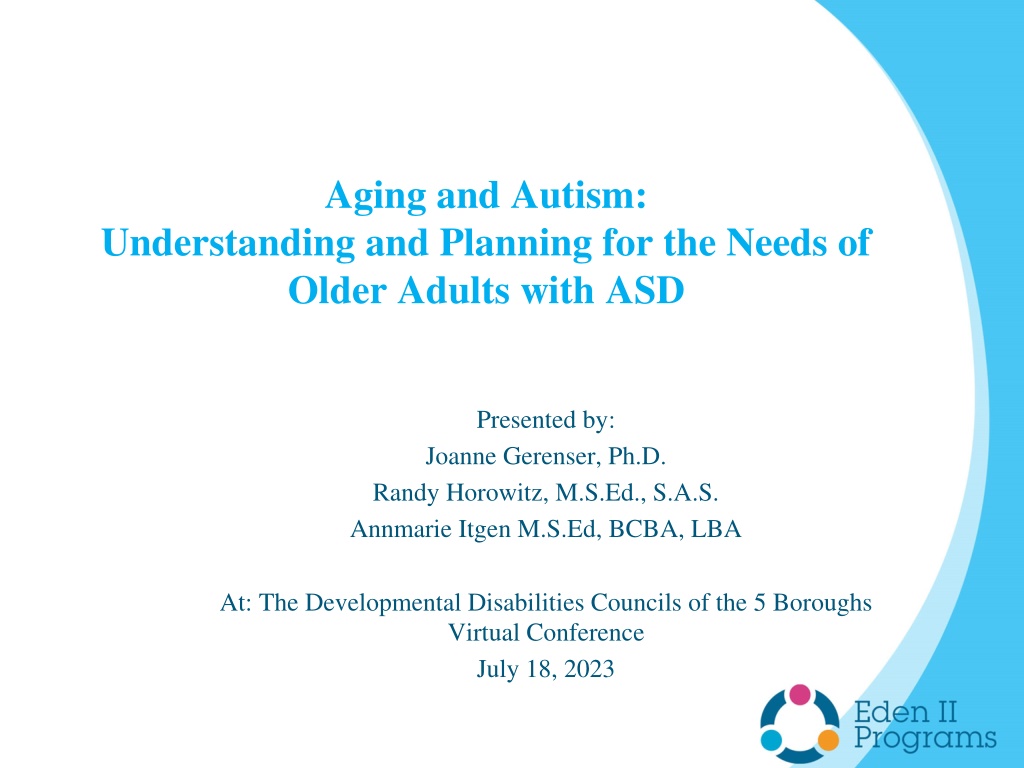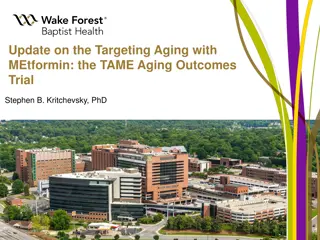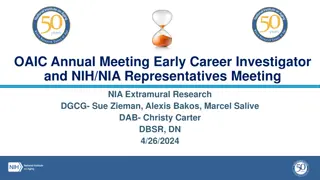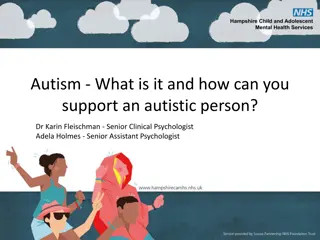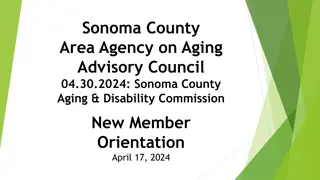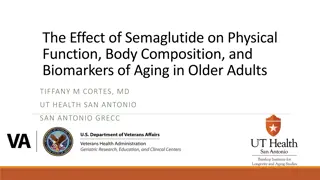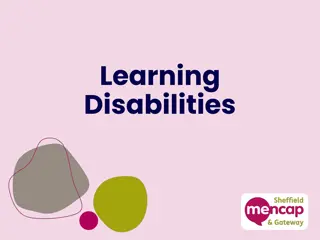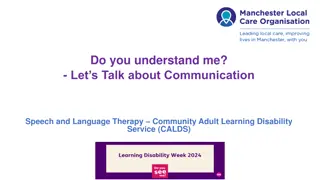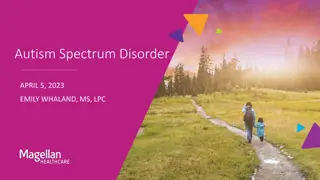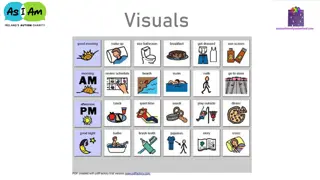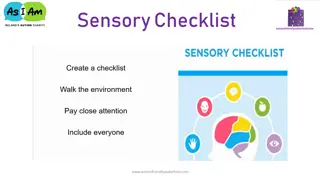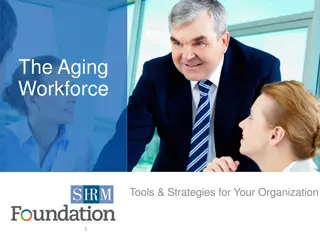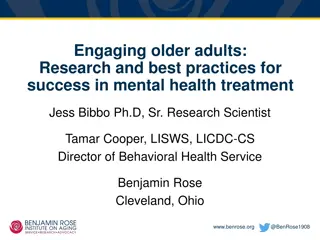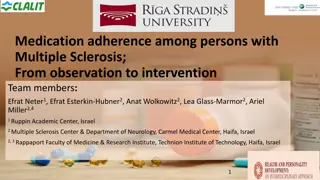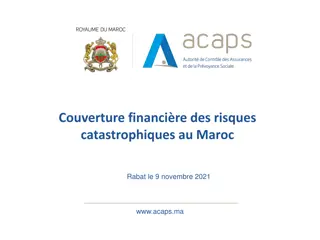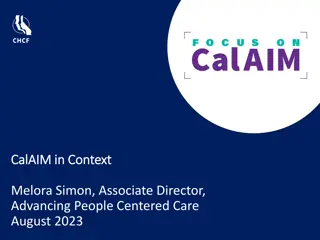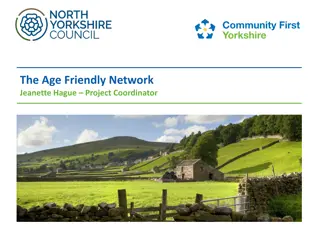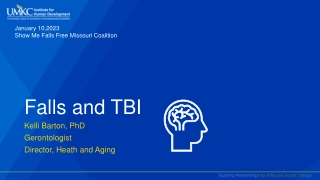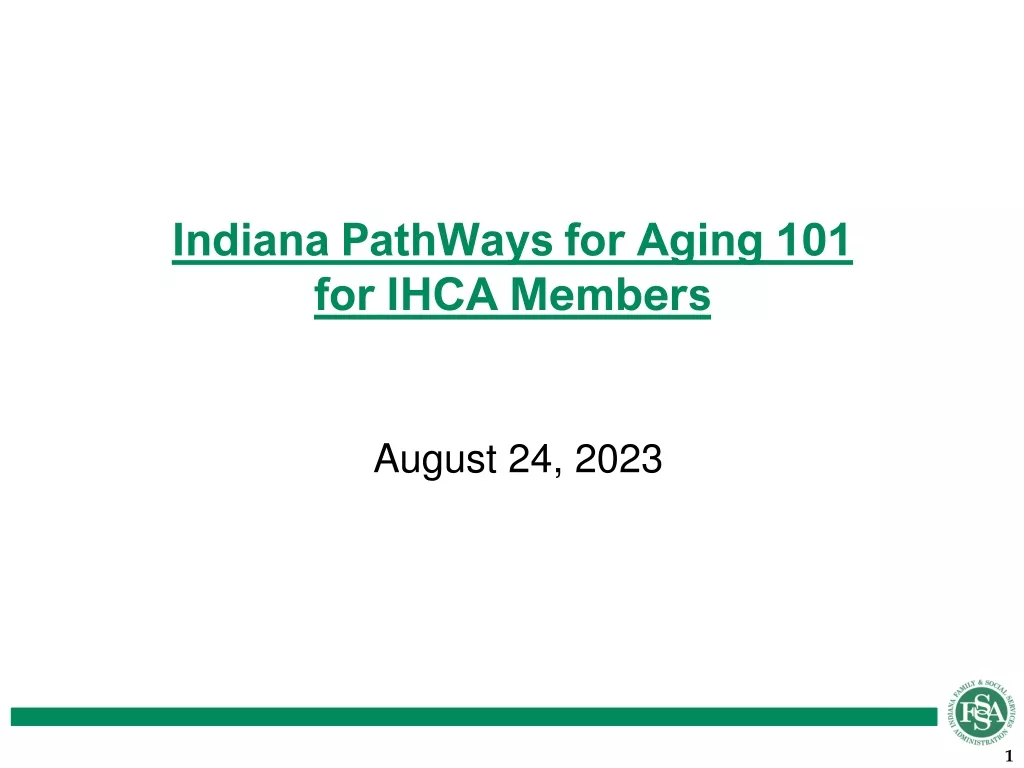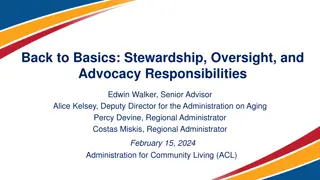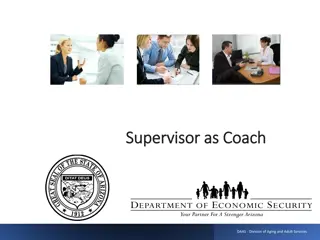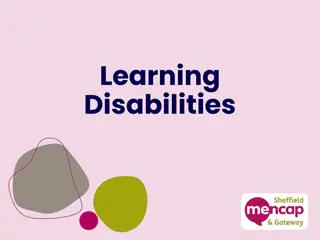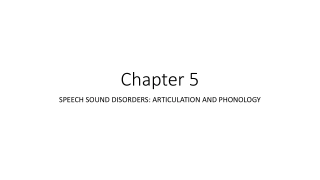Understanding the Aging Challenges Faced by Individuals with Autism
Aging individuals with Autism Spectrum Disorder (ASD) encounter various unique challenges such as communication difficulties, sensory issues, and social skills decline. Issues in aging, including caregiving, brain health, and mobility, are exacerbated for seniors with ASD. Addressing the needs of older adults with ASD requires specialized support and understanding to ensure their well-being and quality of life.
Download Presentation
Please find below an Image/Link to download the presentation.
The content on the website is provided AS IS for your information and personal use only. It may not be sold, licensed, or shared on other websites without obtaining consent from the author. Download presentation by click this link. If you encounter any issues during the download, it is possible that the publisher has removed the file from their server.
Presentation Transcript
Aging and Autism: Understanding and Planning for the Needs of Older Adults with ASD Presented by: Joanne Gerenser, Ph.D. Randy Horowitz, M.S.Ed., S.A.S. Annmarie Itgen M.S.Ed, BCBA, LBA At: The Developmental Disabilities Councils of the 5 Boroughs Virtual Conference July 18, 2023
One of the most complicated and worrisome issues facing families and providers of individuals with autism is providing long- term living and learning opportunities as the participants age
Issues in Aging: General Population Engagement and purpose- Helping older adults get and stay meaningfully engaged is critical for their health and the health of our communities. Mobility and movement- Remaining safe and mobile are top priorities for older adults. Daily living and lifestyle - One third of people over 65 need assistance with at least one activity of daily living (e.g. eating, bathing, dressing). Caregiving- Families need support and training On the professional side, staff shortages and quality of care are huge concerns Care coordination- Two-thirds of seniors have at least two chronic conditions. Brain health - 10% of adults 65 and over develop Alzheimer s disease and this % doubles every five years after that.
The impact of aging can be much more traumatic and/or challenging for the individual with ASD due to: -less flexibility (physically and mentally), -more sensory issues, -and decreasing social skills. ASD= Autism Spectrum Disorder
Aging Individuals with Autism Communication and interaction- It is common for seniors with ASD to have difficulty explaining states of health. For example, they may not tell you they are experiencing stiff joints, leg cramps, or heart arrhythmia. This will require skilled observation abilities in the staff who support aging adults on the spectrum Language and learning characteristics skill retention Often associated with co-occurring sensory, physical, and mental health conditions (e.g., four times as likely to suffer gastrointestinal problems and more than twice as likely to have a psychiatric diagnosis than the general population).
Aging Individuals with Autism Although they are at an older age, they may still be "stuck" in the interests and behaviors of a younger era in their lives, such as liking and even obsessing on childish music, movies, toys/games Aggression / self injury Problems with accessibility to services of all types (e.g., residential/housing problems) Lack of appropriately trained support personnel Lack of a lifelong learning environment
Aging in Individuals with Autism More than half of people with ASD have four or more co-occurring conditions Epilepsy Gastrointestinal conditions OCD Depression
Aging in Individuals with Autism Although onset of aging effects are gradual a person with ASD may experience it as sudden for example, not realizing they are losing their hearing until they do realize it.. Diminished hearing and sight..aches and pains can lead to a grumpy disposition
Aging in Individuals with Autism - Individuals with Level 3 Autism are 2.5 times more likely to die early than NT peers - Predictors of early morbidity include: Fair to poor health was # 1 predictor Long term medication use Limited self sufficiency in ADL skills
In addition, most face a future with inadequate financial support, a broader range of general health problems than previously stated, and no longer having their parents to take care of them and voice their needs (Mukaetova-Ladinska et al., 2011).
Individuals with Autism on SI by Age There are about 45 provider agencies on SI serving thousands of adults with autism and developmental disabilities Preliminary data indicate that each agency s current population of seniors over 55 years old: Ranges from 4%- 48%. That s a current average of 22% of agency s combined total population being over 55 years old And this number is rising
In Summary Aging individuals with ASD are in need of a high level of support In light of the rapidly growing geriatric population, coupled with the considerable lack of societal awareness of the realities of aging in ASD, now is the time for our community to investigate and plan for their needs
The Challenges Most individuals with significant autism (Level 3) will not be able to be adequately supported in traditional senior centers or environments due to: High levels of challenging behaviors Sensory issues Communication deficits
The Challenges Many individuals with significant autism who will not longer be able to be adequately supported in traditional adult day programs for people with ASD due to: Ongoing health issues Mobility issues Program structure
The Challenges There is still so much that needs to be investigated to better understand the impact of aging on people with ASD. We do know that there is a greater impact of health problems in people with ASD due to: Lack of reporting of health issues resulting in delayed or no treatment Far less preventative care Long history of medication usage
The Challenges We do know that advanced age is a risk factor for Neuro-Cognitive Disorder (NCD) Other risk factors include: Seizure disorder Depression Sensory dysfunction Metabolic disorders Given the prevalence of the above in ASD, it is likely that they are then predisposed to develop NCD.
People Receiving OPWDD Medicaid Services Sixty percent (60%) of those served by OPWDD are adults ages 21 to 64
Current Adult Day Programs Models A big focus on community integration
Continuum of Care The primary model for day hab over the past decade has been day hab without walls. The problem is that as individuals with ASD age, many simply don t want to go out every day into the community. In many cases, the demands of a without walls model can lead to increased problem behavior.
And At Eden II, even our lowest support needs individuals require a home base to plan their day, and to have time to re-group in between activities. In addition, our staff also need a place for breaks and to attend trainings as needed and required
Continuum of Care Currently there are no adult day programs specifically designed to meet the needs of seniors with autism But there is guidance and research that describe components of effective / quality autism programs
(Some) Components of effective/quality autism programs Interdisciplinary Support Medical team Speech language pathology Psychiatry and/or psychology Occupational and/or physical therapy Public health Social work Experts in aging Highly supportive learning/habilitation environments Instructional/Habilitation Planning Instructional/Habilitation Strategies
Components of Effective Programs in general An effective program / environment would be: Attractive & welcoming Demand free Staffed by specialists with expertise in the field of autism and aging Focused on quality of life programming https://www.ncbi.nlm.nih.gov/pmc/articles/PMC6559228/
More specifically. Facilities modifications ADA modifications such as ramps and other needs as people become less ambulatory Furniture / fixtures Balance comfort and beauty with extreme safety security and durability More center based options (let s be careful about this narrative)
Components of effective autism programs continued Staff training Staff (provider agencies and OPWDD) need training in the aging process and how this may look in people with ASD More medical support and training will be essential so staff are better prepared to deal with issues such as: Diabetes Vision and hearing loss Mobility issues Heart disease Dementia Depression
Functional Approach to Challenging Behavior Modifying antecedent or setting events. Implementing consequence strategies. Using highly-preferred materials or activities as teaching materials or reinforcers. Alternating preferred and non-preferred activities. Prompting or modeling appropriate responses with gradual prompt fading.
Options Increased collaboration with elder care programs Modification to funding to allow for participants to be supported in adult day centers (with appropriate staff) Modifications to funding to allow participants, who have been moved to nursing homes, the opportunity to attend adult day programs with appropriate staff
Options Integrated Specialized Senior Center Develop a specialized senior day program Further specialize at different sites Non ambulatory/medically fragile Challenging behaviors with or without dementia
Integrated Specialized Senior Center Participant can attend program as much or as little as desired Typical aging adults can attend the program
Annmaries Experiences Senior center activities planning and building strategic partnerships to develop options that will meet the needs of aging individuals with autism. Focus on preference and choice Building a robust schedule of meaningful leisure, health, wellness and nutrition activities
Integrated Senior Center There is currently no program available on Staten Island for individuals with severe autism who are aging Eden II s adult program opened in 1982 and has a number of participants in their 50s and 60s. And this number is rising Eden II Programs
We want to share our vision for a Senior Center for the Autism Community As we strive to fulfill our mission: to support people with ASD through their lifespan, and - to be recognized as a model of excellence in the community for meeting the needs of seniors with ASD -
Health Outcomes Community Outcomes
Health Outcome Traditional Senior Center Activity Customized or Modified for Individuals with ASD Welcoming Atmosphere Games, special events Sensory rooms / activities Regular newsletter Congregate meals Communication workshops Establish social networks onsite One to one meals Social Enterprises: Coffee bar / caf Greenhouse / Garden Beds Physical activity allows people to live longer and healthier lives Variety of exercise and activity classes Health surveys, screening clinics Immunization and other preventive measures Evidence-based disease and disability prevention Programs Lifelong learning as appropriate Lectures and classes: Computer Literacy Brain Health and Exercises Current Events Positive Nutrition In later life eating well can be the key to staying mentally sharp, emotionally balanced and energetic Host potlucks Cooking Classes Gardening Classes Activities (on Healthy Eating) Improve strength and balance Health Promotion and Chronic Disease Management Visual schedules Maintain Cognitive Health Direct Instruction Sensitive to selectivity & sensory issues
Community Outcome Senior Center Activity Specialized Activity for Individuals with ASD Highest Level of Community Involvement Members volunteer at the center Volunteer teams for community service projects Matching services for individual volunteer interests Be open minded about interests and be creative with age appropriate interests Resource Center for Aging in Place Access to opportunities for socialization and mental stimulation Access to medical screenings and preventive care Access to transportation to/from medical appointments Pair with special SR Community Continuum of Care Health screening Flu and other vaccines Chronic disease education, prevention, management Targeted exercise groups Fall prevention Discrimination Training Minimize Transitions
Integrated Senior Center Next Steps Develop Advisory Board Comprised of Three Major Area: Autism (individuals, families, support staff) Aging (experts) Medical professionals Create plans to have Eden II access the center The majority of funding will come from OPWDD Other funding will come from grants and philanthropy Identify community partners Community Agency for Senior Citizens (CASC) Jewish Community Center (JCC) Supreme Chocolatiers
Advisory Board compromised of three areas of focus: - Autism (individuals, families, support staff) - Aging - Medical Plan is to have Eden II use the Senior Center The majority of funding will come from OPWDD Other funding will come from grants and philanthropy Potential collaborations include: - Community Agency for Senior Citizens (CASC) - Jewish Community Center (JCC) - Supreme Chocolatiers Eden II Programs
Our nations intermediate care and skilled nursing facilities are not equipped or appropriately staffed to manage the growing number of admissions of people with language, communication, socialization, and behavioral issues seen in ASD. It will be important that adequate resources are available, particularly in personnel and training, so that individuals can continue to function at the requisite highest practicable level. Pamela Smith (2012)
References Charlton, R. (2017, September 5). Research autism and ageing. National Autistic Society. https://www.autism.org.uk/advice-and- guidance/professional-practice/research-ageing Crabtree, J. , Hickey, A. (2018, February 2). Autism and Ageing: Loneliness and Isolation, National Autistic. https://autism.org.uk/advice- and-guidance/professional-practice/ageing-loneliness Donvan, J, & Zucker, C (2016). In a Different Key: The Story of Autism. Crown Publishers. Gillot, A., Standen, P.J., (2007). Levels of anxiety and sources of stress in adults with autism. Journal of Intellectual Disabilities 11 (4), 359- 70. https://doi.org/10.1177/1744629507083585 Gottlieb, E. (2015). Adult, Autistic and Ignored. The New York Times, Opinion. Halladay, A. (2018, December 23). A 2018 year of review of scientific research. Autism Science Foundation. https://Autism science foundation.org/year-end-summary-2018 Howlin P. (2021). Adults with autism: Changes in understanding since DSM-111. Journal of autism and developmental disorders, 51(12), 4291 4308. https://doi.org/10.1007/s10803-020-04847-z Mazurek M. O. (2014). Loneliness, friendship, and well-being in adults with autism spectrum disorders. Autism : the international journal of research and practice, 18(3), 223 232. https://doi.org/10.1177/1362361312474121 Robison, J. (2018, September 2). Life, love and happiness for autistic adults-What happens to autistic people as they age? Psychology Today. https://www.psychologytoday.com/us/blog/my-life-aspergers/201809/life-love-and-happiness-autistic-adults Sacks, O., Silberman, S. (2013) Neuro Tribes: The Legacy of Autism and the Future of Neurodiversity. Penguin Books. Schall, C., Smith, M., & Wehman, P (2009). Autism and the transition to adulthood: Success beyond the classroom. Brookes. Vaillancourt, M. (2016, April 2). It is no surprise that people with autism have a low life expectancy. Independent Minds. https://www.independent.co.uk/voices/it-s-no-surprise-that-people-with-autism-have-a-low-life-expectancy-our-needs-as-adults-are-being- ignored-a6964751.html
Thank You www.eden2.org Eden II Programs
